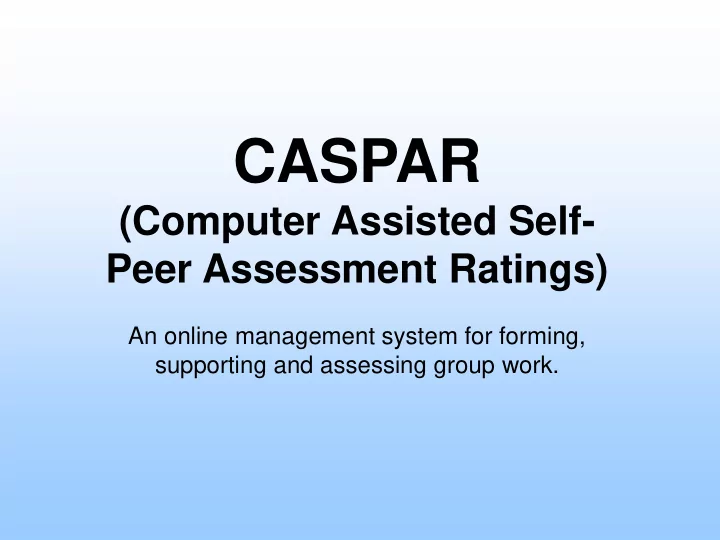

CASPAR (Computer Assisted Self- Peer Assessment Ratings) An online management system for forming, supporting and assessing group work.
Group work is a key skill for all graduates to possess becoming: “increasingly important in higher education with the greater emphasis on skills and lifelong learning. We want students not only to be effective during their studies but also as future employees” - Group Work , The Higher Education Academy, viewed on 8 July 2009, <http://www.heacademy.ac.uk/ourwork/learning/assessment/Group>
Students do not like group work.
Students do not like group work.
All students asked, liked group work when it went well. All agreed that when the group dynamic works, group work has a positive impact on learning and assessment.
Issues with group work. • Fair individual mark allocation • The process needs to be assessed as well as the end result and the tutor is not around for much of the work. • The tendency to enclose problems within the group and inform tutor as last resort. • The dominator. • The members that never turn up. • The members that turn up and do nothing. • Personality clashes.
GWAMP Group Work Assessment in Media Practice • Project funded by HEFCE from 2000-2004. • The aim of the project was to find and share good practice in group work and assessment, with a particular emphasis on media practice related disciplines. http://www.cemp.ac.uk/themes/groupworkassess ment/
The key features of CASPAR are: • Sorts and manages students in groups • Students input marks and feedback comments on themselves and others • Ease of data management allows for multiple formative assessment points • Students view graphs depicting their development over time • Students read feedback from their peers • Feedback can be anonymous or not • Provides an online group journal that helps students keep a record of their project as it develops, and an easy way for staff to contact a group at a time • Tutor views student feedback and marks easily, all information at fingertips • The system points out potential marking discrepancies and late submission to aid moderation • A large amount of feedback generated • The system is flexible enough to be deployed effectively across a range of learning and teaching situations and disciplines - CASPAR User Guide v2.0
Computer Assisted Self/Peer Assessment as a solution This approach brings with it the general benefits of peer assessment and has several additional benefits: • Students are more likely to contribute to the group process if they know the effort will be rewarded. • It can provide them with feedback on their teamwork skills and contribution to the group. • It can also help to divide the „product‟ mark more fairly in relation to individual students‟ contribution to the group. • This approach is user-friendly and more productive than traditional paper approaches to self-peer assessment. - Bloxham, S Teaching and Assessing Groups in Higer Education , The Higher Education Academy, viewed on 12 June 2010, <http://www.psychology.heacademy.ac.uk/docs/doc/Teaching_and_assessi ng_groups.doc>
The Trial
Assessment Criteria Contribution to the group discussions, meetings and decision-making. Ability to carry out tasks allocated by the group. Enthusiasm and effort in carrying allocated tasks. Punctuality and attendance.
Other possible assessment criteria Researching, analysing & preparing material for the task Support & encouragement of group members Acceptance and willingness to act upon advice and criticism (It may be helpful to develop assessment criteria with students. This may increase their confidence in using them.)
Case Studies
Findings
Limitations of CASPAR specific rather than general software development. small software development team the process of importing students and assigning groups is time consuming. feedback cannot be removed or moderated editable projects? yet another electronic platform for students to access.
Is BlackBoard 9 the solution?
Recommend
More recommend